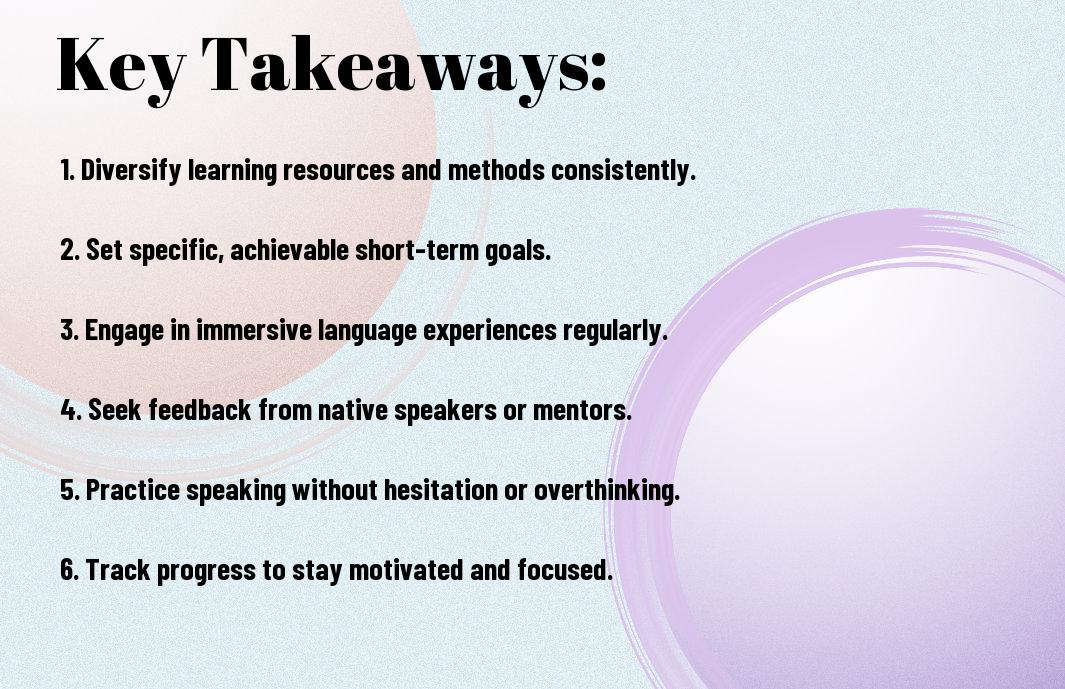You’ve hit a wall in your language learning journey. Your progress has stalled, and you’re struggling to make sense of unfamiliar grammar rules or vocabulary. You feel like you’re not getting any better, no matter how hard you try. Your motivation is dwindling, and frustration is setting in. It’s time to change your approach and find a way to overcome this hurdle. You need anew strategy to break through the plateau and continue improving your language skills.
Key Takeaways:
To overcome language learning plateaus, consider the following strategies:
- Set specific goals and track progress to maintain motivation and direction, helping you stay focused on what you want to achieve in your language learning journey.
- Practice active learning by engaging in conversations, writing, and speaking, rather than just passive listening or reading, to improve your language skills.
- Immerse yourself in the language by listening to authentic materials, such as podcasts, TV shows, or movies, to get used to the natural flow and rhythm of the language.
- Focus on consistent practice, even if it’s just a few minutes a day, to develop a habit and make progress over time, rather than trying to cram all your practice into one or two long sessions.
- Seek out diverse language learning resources and activities, such as language exchange partners, online courses, or language learning apps, to keep your learning fresh and engaging.

Identifying Plateaus
To break through a language learning plateau, you need to acknowledge its presence. You’ve been studying for a while, but your progress has slowed down. Your routine has become stale, and you’re not seeing improvements. It’s time to assess your situation and make a change.
Recognizing the Signs
Around you, signs of a plateau are evident. Your motivation is waning, and your practice sessions have become stagnant. You’re not challenging yourself, and your language skills are suffering as a result. You need to take a step back and evaluate your approach.
Assessing Progress
Any honest evaluation of your progress will reveal areas for improvement. You can start by tracking your efforts, setting achievable goals, and seeking feedback from others. This will help you pinpoint where you’re struggling and what you need to work on.
Indeed, assessing your progress is an ongoing process. You’ll need to regularly evaluate your language skills, identifying strengths and weaknesses. By doing so, you’ll be able to adjust your strategy, stay motivated, and continue making progress towards your language learning goals. You’ll be able to refine your approach, addressing areas where you’re struggling and building on your successes.

Setting Goals
While breaking a language learning plateau, you need to set clear goals. Your objectives will guide your efforts, helping you stay focused on what you want to achieve.
Defining Objectives
Beneath every successful language learner lies a clear definition of their goals. You identify what you want to accomplish, whether it’s improving conversation skills or reading comprehension, and make your objectives specific and measurable.
Creating a Plan
Amidst the process of breaking your plateau, you start creating a plan. Your plan outlines the steps you’ll take to reach your goals, including the resources you’ll use and the time you’ll dedicate to practice.
Setting a realistic timeline is key to creating a plan that works for you. You break down your goals into smaller, manageable tasks, and schedule them in your daily or weekly routine, ensuring steady progress and tracking your advancement along the way.
Refreshing Your Approach
Trying New Methods
Approximately the same techniques that have been holding you back can be modified or replaced. You can try new language learning methods, such as speaking with native speakers or using flashcards, to revive your progress.
Exploring Different Resources
Above all, your resources may be limiting your growth. You can explore different textbooks, podcasts, or online courses to find what works best for you.
Despite the challenges you face, developing a consistent language learning routine is key to breaking through plateaus. You need to make language learning a habit, something you do daily, to see progress and improvement over time.
Establishing a Routine
Beneath the surface of language learning lies the foundation of a well-structured routine. You will find that setting aside a specific time each day to study and practice your target language helps you stay focused and motivated.
Tracking Progress
Alongside your daily routine, monitoring your progress is vital. You should keep a journal or use an app to track your achievements and identify areas that need improvement.
At this stage, you’ll start to notice patterns and trends in your learning. You can use this information to adjust your routine, making adjustments to maximize your progress and stay on track. Your progress may be slow, but with persistence and the right approach, you’ll break through the plateau and continue to improve your language skills.
Overcoming Obstacles
For every language learner, obstacles are inevitable. You’ll encounter setbacks, but finding Solutions for language learning challenges can help you move forward. You must identify the issues hindering your progress and tackle them head-on.
Managing Frustration
Any language learner knows frustration is a common emotion. You feel stuck, and progress seems slow. Identifying the sources of your frustration is key to overcoming it, and you must take a step back to reassess your approach.
Finding Motivation
For you to stay motivated, setting achievable goals is important. You need to celebrate your successes, no matter how small, to keep yourself driven. This mindset will help you push through the tough times.
Due to the fact that motivation can wane, you must find ways to keep yourself engaged. You can try changing your study routine, finding a language partner, or rewarding yourself for reaching milestones. By doing so, you’ll stay motivated and focused on your language learning journey, and you’ll be able to overcome the plateau that’s holding you back.
Seeking Help
Keep pushing forward, even when progress seems slow. You need outside help to break the plateau. Look for language exchange partners or professional tutors who can guide you.
Language Exchange Partners
Approximately the same time you start feeling stuck, find a language partner to practice with. You can find them online or in language meetups, and they’ll help you improve your speaking skills.
Professional Guidance
Prior to giving up, consider hiring a professional tutor who can identify your weaknesses and create a personalized plan to help you improve.
And as you work with a tutor, you’ll get feedback on your pronunciation, grammar, and vocabulary, allowing you to focus on the areas where you need the most improvement, and your progress will become noticeable again.
Final Words
With these considerations, you’ll overcome your stagnation. You’ve got the tools to break through your language learning plateaus. For more unorthodox methods, check out Language Learning Plateaus: My Weirdest Ways to Break Them. Now, you can shatter your barriers and keep moving forward, improving your language skills with your newfound strategies.
FAQ
Q: What is a language learning plateau and how do I know I’ve reached one?
A: A language learning plateau is a period where you feel like you’re not making progress in your language learning journey, despite consistent effort. You might feel like you’re stuck at the same level, unable to improve your skills or understand more complex materials. To identify if you’ve reached a plateau, look for signs such as feeling bored or unchallenged, struggling to understand or express yourself in conversations, or scoring similarly on language proficiency tests over time. If you’ve experienced any of these symptoms, it’s time to reassess your learning strategy and make adjustments to overcome the plateau.
Q: How can I break a language learning plateau by adjusting my study routine?
A: To break a language learning plateau, try shaking up your study routine by incorporating new materials, activities, and resources. This can include switching to a different textbook or language learning app, practicing with a language exchange partner, or focusing on a specific skill such as writing, listening, or speaking. You can also try setting new, achievable goals and tracking your progress to stay motivated. Additionally, consider immersing yourself in the language by watching TV shows or movies, listening to podcasts or music, or speaking with native speakers to expose yourself to authentic language use and boost your comprehension and production skills.
Q: What role does self-reflection and goal-setting play in overcoming a language learning plateau?
A: Self-reflection and goal-setting are crucial in overcoming a language learning plateau. Take time to evaluate your strengths, weaknesses, and learning style to identify areas where you need improvement. Set specific, measurable, and attainable goals, both short-term and long-term, to help you stay focused and motivated. Break down larger goals into smaller, manageable tasks to maintain a sense of accomplishment and progress. Regularly assessing your progress and adjusting your goals as needed will help you stay on track, overcome obstacles, and ultimately break through the plateau to continued language learning success.

